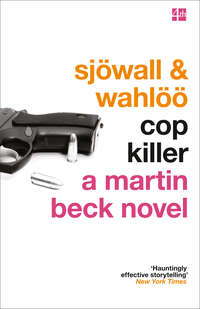
Полная версия
The Laughing Policeman
Kristiansson unlocked the door, switched on the light in the room and pulled off the man's wet overcoat. The drunk lurched, collapsed on to the bed and said, ‘Thanksh, Miss.’
Then he turned over on his side and fell asleep. Kristiansson laid the keys on a kitchen chair beside the bed, put out the light, shut the door and went back to the car.
‘Good night, madam,’ he said.
The woman stared at him with pursed lips, tossed her head and disappeared.
Kristiansson did not act like this from love of his fellow humans, but because he was lazy.
None knew this better than Kvant. While they were still serving as ordinary beat officers on the beat in Malmö, he had many a time seen Kristiansson lead drunks along the street and even across bridges in order to get them into the next precinct.
Kvant sat at the wheel. He switched on the ignition and said sourly, ‘Siv oftentimes says I'm lazy. She should see you.’
Siv was Kvant's wife and also his dearest and often sole subject of conversation.
‘Why should I get puked on for nothing?’ Kristiansson said philosophically.
Kristiansson and Kvant were similar in build and appearance. Both were 6 feet 1 inch tall, fair, broad-shouldered and blue-eyed. But they had widely different temperaments and didn't always see eye to eye. This was one of the questions upon which they were not in agreement.
Kvant was incorruptible. He never compromised over things he saw, but on the other hand he was an expert at seeing as little as possible.
He drove slowly, in glum silence, following a twisting route from Huvudsta that led past the Police Training College, then through an area of communal garden plots, past the railway museum, the National Bacteriological Laboratory, the School for the Blind, and then zigzagging through the extensive university district with its various institutions, finally emerging via the railway administration buildings on to Tomtebodavägen.
It was a brilliantly thought-out course, leading through areas which were almost guaranteed to be empty of people. They met not a single car the whole way and saw only two living creatures, first a cat and then another cat.
When they reached the end of Tomtebodavägen, Kvant stopped the car with the radiator one yard from the Stockholm city limit and let the engine idle while he considered how to arrange the rest of their shift.
I wonder if you've got the cheek to turn around and drive back the same way. Kristiansson thought. Aloud he said, ‘Can you lend me 10 kronor?’
Kvant nodded, took his wallet out of his breast pocket and handed the note to his colleague without even a glance at him. At the same instant he made a quick decision. If he crossed the city limits and followed Norra Stationsgatan for some five hundred yards in a north-easterly direction they would only need to be in Stockholm for two minutes. Then he could turn in to Eugeniävagen, drive across the hospital area and continue through Haga Park and along by the Northern Cemetery, finishing up finally at police headquarters. By that time their shift would be over and the chance of seeing anyone on the way should be infinitesimal.
The car drove into Stockholm and turned left onto Norra Stationsgatan.
Kristiansson tucked the 10 kronor into his pocket and yawned. Then he peered out into the pouring rain and said, Over there, running this way's a bastard.'
Kristiansson and Kvant were from Skåne, in the far South, and their sense of word order left much to be desired.
‘He has a dog, too,’ Kristiansson said. ‘And he's waving at us.’
‘It's not my table,’ Kvant said.
The man with the dog, an absurdly small dog which he practically dragged after him through the puddles, rushed out into the road and planted himself right in front of the car.
‘God damn!’ Kvant swore, jamming on the brakes.
He wound the side window down and roared, ‘What do you mean by running out into the road like that?’
‘There's …there's a bus over there,’ the man gasped out, pointing along the street.
‘So what?’ Kvant said rudely. ‘And how can you treat the dog like that? A poor dumb animal?’
‘There's … there's been an accident.’
‘All right, we'll look into it,’ Kvant said impatiently. ‘Move aside.’
He drove on.
‘And don't do that again!’ he shouted over his shoulder.
Kristiansson stared through the rain.
‘Yes,’ he said resignedly. ‘A bus has driven off the road. One of those doubledeckers.’
‘And the lights are on,’ Kvant said. ‘And the door in front is open. Hop out and take a look, Kalle.’
He pulled up at an angle behind the bus. Kristiansson opened the door, straightened his shoulder belt automatically and said to himself, ‘A-ha, and what's all this?’
Like Kvant, he was dressed in boots and leather jacket with shiny buttons and carried a truncheon and pistol at his belt.
Kvant remained sitting in the car, watching Kristiansson, who moved leisurely towards the open front door of the bus.
Kvant saw him grasp the rail and lazily heave himself up on to the step to peer into the bus. Then he gave a start and crouched down quickly, while his right hand flew to the pistol holster.
Kvant reacted swiftly. It took him only a second to switch on the red lamps, the searchlight and the orange flashing light of the patrol car.
Kristiansson was still crouching down beside the bus when Kvant flung open the car door and rushed out into the downpour. All the same, Kvant had drawn and cocked his 7.65 mm Walther and had even cast a glance at his watch.
It showed exactly thirteen minutes past eleven.
4
The first senior policeman to arrive at Norra Stationsgatan was Gunvald Larsson.
He had been sitting at his desk at police headquarters at Kungsholmen, thumbing through a dull and wordy report, very listlessly and for about the umpteenth time, while he wondered why on earth people didn't go home.
In the category of ‘people’ he included the police commissioner, a deputy commissioner and several different superintendents and inspectors who, on account of the happily concluded riots, were trotting about the staircases and corridors. As soon as these persons thought fit to call it a day and take themselves off, he would do so himself, as fast as possible.
The phone rang. He grunted and picked up the receiver.
‘Hello. Larsson.’
‘Radio Central here. A Solna radio patrol has found a whole bus full of dead bodies on Norra Stationsgatan.’
Gunvald Larsson glanced at the electric wall clock, which showed eighteen minutes past eleven, and said, ‘How can a Solna radio patrol find a bus full of dead bodies in Stockholm?’
Gunvald Larsson was a detective inspector in the Stockholm homicide squad. He had a rigid disposition and was not one of the most popular members of the force.
But he never wasted any time and so he was the first one there.
He braked the car, turned up his coat collar and stepped out into the rain. He saw a red doubledecker bus standing right across the pavement; the front part had broken through a high wire fence. He also saw a black Plymouth with white mudguard, and the word POLICE in white block letters across the doors. It had its emergency lights on and in the cone of the searchlight stood two uniformed patrolmen with pistols in their hands. Both looked unnaturally pale. One of them had vomited down the front of his leather jacket and was wiping himself in embarrassment with a sodden handkerchief.
‘What's the trouble?’ Gunvald Larsson asked.
‘There … there are a lot of corpses in there,’ said one of the policemen.
‘Yes,’ said the other. ‘Yes, that's right. There are. And a lot of cartridges.’
‘And a man who shows signs of life.’
‘And a policeman.’
‘A policeman?’ Gunvald Larsson asked.
‘Yes. A CID man.’
‘We recognize him. He works at Västberga. On the homicide squad.’
‘But we don't know his name. He has a blue raincoat. And he's dead.’
The two radio police both talked at once, uncertainly and quietly.
They were anything but small, but beside Gunvald Larsson they did not look very impressive.
Gunvald Larsson was 6 feet 5 inches tall and weighed nearly sixteen stone. His shoulders were as broad as those of a professional heavyweight boxer and he had huge, hairy hands. His fair hair, brushed back, was already dripping wet.
The sound of many wailing sirens cut through the splashing of the rain. They seemed to be coming from all directions. Gunvald Larsson pricked up his ears and said, ‘Is this Solna?’
‘Right on the city limits,’ Kvant replied slyly.
Gunvald Larsson cast an expressionless blue glance from Kristiansson to Kvant. Then he strode over to the bus.
‘It looks like … like a shambles in there,’ Kristiansson said.
Gunvald Larsson didn't touch the bus. He stuck his head in through the open door and looked around.
‘Yes,’ he said calmly. ‘So it does.’
5
Martin Beck stopped in the doorway of his flat in Bagarmossen. He took off his raincoat and shook the water off it on the landing before hanging it up and closing the door.
It was dark in the hall but he didn't bother to switch on the light. He saw a ray of light under the door of his daughter's room and he heard the radio or record player going inside. He knocked and went in.
The girl's name was Ingrid and she was sixteen. She had matured somewhat of late, and Martin Beck got on with her much better than before. She was calm, matter-of-fact and fairly intelligent, and he liked talking to her. She was in the sixth year of the comprehensive school and had no difficulty with her schoolwork, without on that account being what in his day had been called a swot.
She was lying on her back in bed, reading. The record player on the bedside table was going. Not pop music but something classical, Beethoven, he guessed.
‘Hello,’ he said. ‘Not asleep yet?’
He stopped, almost paralysed by the utter futility of his words. For a moment he thought of all the trivialities that had been spoken between these walls during the last ten years.
Ingrid put down her book and shut off the record player.
‘Hi, Dad. What did you say?’
He shook his head.
‘Lord, how wet your legs are,’ the girl said. ‘Is it raining so hard?’
‘Cats and dogs. Are Mum and Rolf asleep?’
‘I think so. Mum bundled Rolf off to bed right after dinner. She said he had a cold.’
Martin Beck sat down on the bed.
‘Didn't he have?’
‘Well, I thought he looked well enough. But he went to bed without any fuss. Probably in order to get off school tomorrow.’
‘You seem to be hard at work, anyway. What are you studying?’
‘French. We've a test tomorrow. Like to quiz me?’
‘Wouldn't be much use. French isn't my strong point. Go to sleep now instead.’
He stood up and the girl snuggled down obediently under the quilt. He tucked her in and before he shut the door behind him he heard her whisper, ‘Keep your fingers crossed tomorrow.’
‘Good night.’
He went into the kitchen in the dark and stood for a while by the window. The rain seemed to be less heavy now, but it may have been because the kitchen window was sheltered from the wind. Martin Beck wondered what had happened during the demonstration against the American embassy and whether the papers tomorrow would describe the police's behaviour as clumsy and inept or as brutal and provocative. In any case the opinions would be critical. Since he was loyal to the force and had been so for as long as he could remember, Martin Beck admitted only to himself that the criticism was often justified, even if it was a bit one-sided. He thought of what Ingrid had said one evening a few weeks ago. Many of her schoolmates were politically active, taking part in meetings and demonstrations, and most of them strongly disliked the police. As a child, she had said, she could boast and be proud of the fact that her father was a policeman, but now she preferred to keep quiet about it. Not that she was ashamed, but she was often drawn into discussions in which she was expected to stand up for the entire police force. Silly, of course, but there it was.
Martin Beck went into the living room, listened at the door of his wife's bedroom and heard her light snoring. Cautiously he let down the sofa bed, switched on the wall lamp and drew the curtains. He had bought the sofa recently and moved out of the common bedroom, on the pretext that he didn't want to disturb his wife when he came home late at night. She had protested, pointing out that sometimes he worked all night and therefore must sleep in the daytime, and she didn't want him lying there making a mess of the living room. He had promised on these occasions to lie and make a mess in the bedroom; she wasn't in there much in the daytime anyway. Now he had been sleeping in the living room for the past month and liked it.
His wife's name was Inga.
Relations between them had worsened with the years, and it was a relief not to have to share a bed with her. This feeling sometimes gave him a bad conscience, but after seventeen years of marriage there didn't seem to be much he could do about it, and he had long since given up worrying over whose fault it might be.
Martin Beck stifled a coughing attack, took off his wet trousers and hung them over a chair near the radiator. As he sat on the sofa pulling off his socks it crossed his mind that Kollberg's nocturnal walks in the rain might be due to the fact that his marriage, too, was slipping into boredom and routine.
Already? Kollberg had only been married for eighteen months.
Before the first sock was off he had dismissed the thought. Lennart and Gun were happy together, not a doubt of that. Besides, what business was it of his?
He got up and walked naked across the room to the bookshelf. He looked over the books for a long time before choosing one. It was written by the old English diplomat Sir Eugene Millington-Drake and was about the Graf Spee and the Battle of La Plata. He had bought it secondhand about a year ago but hadn't yet taken the time to read it. He crawled down into bed, coughed guiltily, opened the book and found he had no cigarettes. One of the advantages of the sofa bed was that he could now smoke in bed without complications.
He got up again, took a damp and flattened pack of Floridas out of his raincoat pocket, laid out the cigarettes to dry on the bedside table and lit the one that seemed most likely to burn. He had the cigarette between his teeth and one leg in bed when the telephone rang.
The telephone was out in the hall. Six months ago he had ordered an extra extension to be installed in the living room, but knowing the normal working speed of the Telephone Service, he imagined he'd be lucky if he had to wait only another six months before the extension was installed.
He strode quickly across the floor and lifted the receiver before the second ring had finished.
‘Beck.’
‘Superintendent Beck?’
He didn't recognize the voice at the other end.
‘Yes, speaking.’
‘This is Radio Central. Several passengers have been found shot dead in a bus on route 47 near the end of the line on Norra Stationsgatan. You're asked to go there at once.’
Martin Beck's first thought was that he was a victim of a practical joke or that some antagonist was trying to trick him to go out into the rain just to give him trouble.
‘Who gave you the message?’ he asked.
‘Hansson from the Fifth. Superintendent Hammar has already been notified.’
‘How many dead?’
‘They're not sure yet. Six at least.’
‘Anyone arrested?’
‘Not as far as I know.’
Martin Beck thought: I'll pick up Kollberg on the way. Hope there's a taxi. And said, ‘OK, I'll come at once.’
‘Oh, Superintendent …’
‘Yes?’
‘One of the dead … he seems to be one of your men.’
Martin Beck gripped the receiver hard.
‘Who?’
‘I don't know. They didn't say a name.’
Martin Beck flung down the receiver and leaned his head against the wall. Lennart! It must be him. What the hell was he doing out in the rain? What the hell was he doing on a 47 bus? No, not Kollberg, it must be a mistake.
He picked up the phone and dialled Kollberg's number. He heard a ring at the other end. Two. Three. Four. Five.
‘Kollberg.’
It was Gun's sleepy voice. Martin Beck tried to sound calm and natural.
‘Hello. Is Lennart there?’
He thought he heard the bed creak as she sat up, and it was an eternity before she answered.
‘No, not in bed at any rate. I thought he was with you. Or rather that you were here.’
‘He left when I did. To take a walk. Are you sure he's not at home?’
‘He may be in the kitchen. Hang on and I'll have a look.’
It was another eternity before she came back.
‘No, Martin, he's not at home.’
Now her voice was anxious.
‘Wherever can he be?’ she said. ‘In this weather?’
‘I expect he's just out getting a breath of air. I just got home, so he can't have been out long. Don't worry.’
‘Shall I ask him to call you when he comes?’
She sounded reassured.
‘No, it's not important. Sleep well. So long.’
He put down the receiver. Suddenly he felt so cold that his teeth were chattering. He picked up the receiver again and stood with it in his hand, thinking that he must call someone and find out exactly what had happened. Then he decided that the best way was to get to the place himself as fast as he could. He dialled the number of the nearest taxi rank and got a reply immediately.
Martin Beck had been a policeman for twenty-three years. During that time several of his colleagues had been killed in the course of duty. It had hit him hard every time it happened, and somewhere at the back of his mind was also the realization that police work was getting more and more risky and that next time it might be his own turn. But when it came to Kollberg, his feelings were not merely those of a colleague. Over the years they had become more and more dependent on each other in their work. They were a good complement to one another and they had learned to understand each other's thoughts and feelings without wasting words. When Kollberg got married eighteen months ago and moved to Skärmarbrink they had also come closer together geographically and had taken to meeting in their spare time.
Quite recently Kollberg had said, in one of his rare moments of depression, ‘If you weren't there, God only knows whether I'd stay on the force.’
Martin Beck thought of this as he pulled on his wet raincoat and ran down the stairs to the waiting taxi.
6
Despite the rain and the late hour a cluster of people had collected outside the cordon towards Karlbergsvägen. They stared curiously at Martin Beck as he got out of the taxi. A young constable in a black raincape made a violent movement to check him, but another policeman grabbed his arm and saluted.
A small man in a light-coloured trench coat and cap placed himself in Martin Beck's way and said, ‘My condolences, Superintendent. I just heard a rumour that one of your –’
Martin Beck gave the man a look that made him swallow the rest of the sentence.
He knew the man in the cap only too well and disliked him intensely. The man was a freelance journalist and called himself a crime reporter. His speciality was reporting murders and his accounts were full of sensational, repulsive and usually erroneous details. In fact only the very worst weeklies published them.
The man slunk off and Martin Beck swung his legs over the rope. He saw that a similar cordon had been made a little farther up towards Torsplan. The roped-off area was swarming with black-and-white cars and unidentifiable figures in shiny raincoats. The ground around the red doubledecker was loose and squelchy.
The bus was lit up inside and the headlights were on, but the cones of light did not reach far in the heavy rain. The ambulance from the State Forensic Laboratory stood at the rear of the bus with its radiator pointing to Karlsbergsvägen. The medico-legal expert's car was also on the scene. Behind the broken wire fence some men were busy setting up floodlights. All these details showed that something far out of the ordinary had happened.
Martin Beck glanced up at the dismal blocks of flats on the other side of the street. Figures were silhouetted in several of the lit windows, and behind rain-streaked panes, like blurred white patches, he saw faces pressed against the glass. A bare-legged woman in boots and with a raincoat over her nightdress came out of an entrance obliquely opposite the scene of the accident. She got halfway across the street before being stopped by a policeman, who took her by the arm and led her back to the doorway. The constable strode along and she half ran beside him while the wet white nightdress twisted itself around her legs.
Martin Beck could not see the doors of the bus but he saw people moving about inside, and presumed that men from the forensic laboratory were already at work. He couldn't see any of his colleagues from the homicide squad, either, but guessed that they were somewhere on the other side of the vehicle.
Involuntarily he slowed his steps. He thought of what he was soon to see and clenched his hands in his coat pockets as he gave the forensic technicians' grey vehicle a wide berth.
In the glow from the doubledecker's open middle doors stood Hammar, who had been his boss for many years and was now a chief superintendent. He was talking to someone who was evidently inside the bus. He broke off and turned to Martin Beck.
‘There you are. I was beginning to think they'd forgotten to call you.’
Martin Beck made no answer but went over to the doors and looked in.
He felt his stomach muscles knotting. It was worse than he had expected.
The cold bright light made every detail stand out with the sharpness of an etching. The whole bus seemed to be full of twisted, lifeless bodies covered with blood.
He would have liked to have turned and walked away and not had to look, but his face did not betray his feelings. Instead, he forced himself to make a systematic mental note of all the details. The men from the laboratory were working silently and methodically. One of them looked at Martin Beck and slowly shook his head.
Martin Beck regarded the bodies one by one. He didn't recognize any of them. At least not in their present state.
‘The one up there,’ he said suddenly, ‘has he …’
He turned to Hammar and broke off short.
Behind Hammar, Kollberg appeared out of the dark, bareheaded and with his hair stuck to his forehead.
Martin Beck stared at him.
‘Hi,’ said Kollberg. ‘I was beginning to wonder what had happened to you. I was about to tell them to call you again.’
He stopped in front of Martin Beck and gave him a searching look.
Then he gave a swift, nauseated glance at the interior of the bus and went on, ‘You need a cup of coffee. I'll get one for you.’
Martin Beck shook his head.
‘Yes,’ Kollberg said.
He squished off. Martin Beck stared after him, then went over to the front doors and looked in. Hammar followed with heavy steps.
The bus driver lay slumped over the wheel. He had evidently been shot through the head. Martin Beck regarded what had been the man's face and was vaguely surprised that he didn't feel any nausea. He turned to Hammar, who was staring expressionlessly out into the rain.
‘What on earth was he doing here?’ Hammar said tonelessly. ‘On this bus?’
And at that instant Martin Beck knew to whom the man on the phone had been referring.
Nearest the window behind the stairs leading to the top deck sat Åke Stenström, detective sub-inspector on the homicide squad and one of Martin Beck's youngest colleagues.








